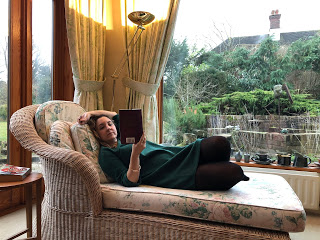
You can tell this book is written from someone’s real life, because it is just so entirely weird. It is a horribly vivid recollection of childhood, and a reminder of just how gruelling growing up can be.
It’s full of reminders of how children see the world; here is the main character, a little girl called Molly, remembering a “. . queer and somehow pleasant horror when once a gull had winked at her and she had seen that his lower eyelid moved and not the upper one.”
And here is a horrifying moment for her brother, when he asks his mother what she is sewing:
“I am making some curtains for Molly’s sitting room,” and held up a pair of bloomers, right in front of Ralph.
The book is full of fun period detail like this. At one point the kids are allowed to come home early from school due to the nosebleeds they always get after ‘their scarlet fever’ while their sisters stay “cooped up in school with nothing at all to do but chew paraffin on the sly”. I’ve heard of sniffing glue but this is another level
Molly and her brother are very close, but over the six years the book covers they grow apart. This is not for the small stuff – as for example, once, when she wears his Boy Scout shirt with the moto ‘Be Prepared’ on it, and he tells her that for a girl to do this is the same as “dragging the American flag through the dirt.” (Note, this is a minor incident in the book, but apparently this actually happened to the author, and she cut the logo off with a knife intentionally mutilating herself as she did so)
What breaks them apart is hard to say, but is partly down to Molly’s bad temper (you can tell this is drawn from life, because the children are not all adorable innocents who need protection but real people who do cruel things). More though, in some weird way, it’s down to sex. Ralph becomes aware of the fact that it is not just farmyard animals who get busy:
He had not, in any conscious way, really connected his knowledge with people, as now he did, to his shame and sorrow, wondering with especial revulsion, about the Follansbees. He found himself compelled to study the faces of the men at the diner table and to look with stunned amazement at Mrs Brotherman
Somehow this leads to their falling out. Molly adds him to her list of unforgivables, which includes almost everybody. Near the end, it includes herself:
. . she reached for her diary and her pencil and to the list of unforgivable she added her own name. She burst into tears and cried until she was hungry, and all the time she cried she watched herself in the mirror, getting uglier and uglier until she looked like an Airedale.
The author’s brother, to whom she was close, died just before she wrote this book, and the writing is alive with all kinds of pain and comedy. Read it if you want to feel grateful to be an adult already.
